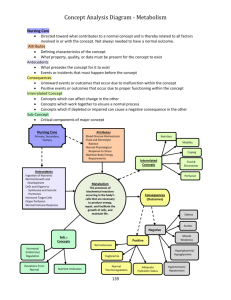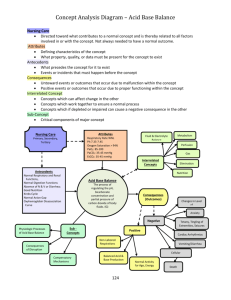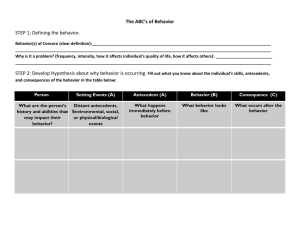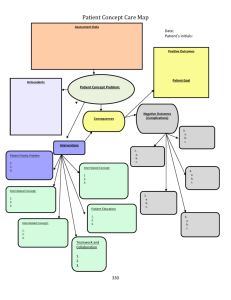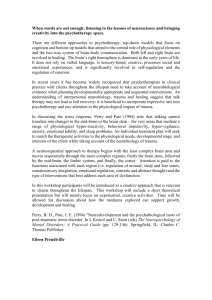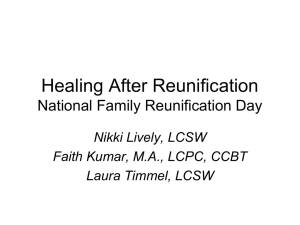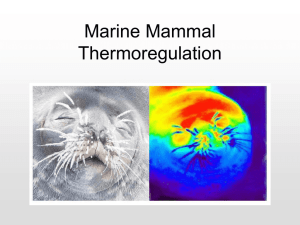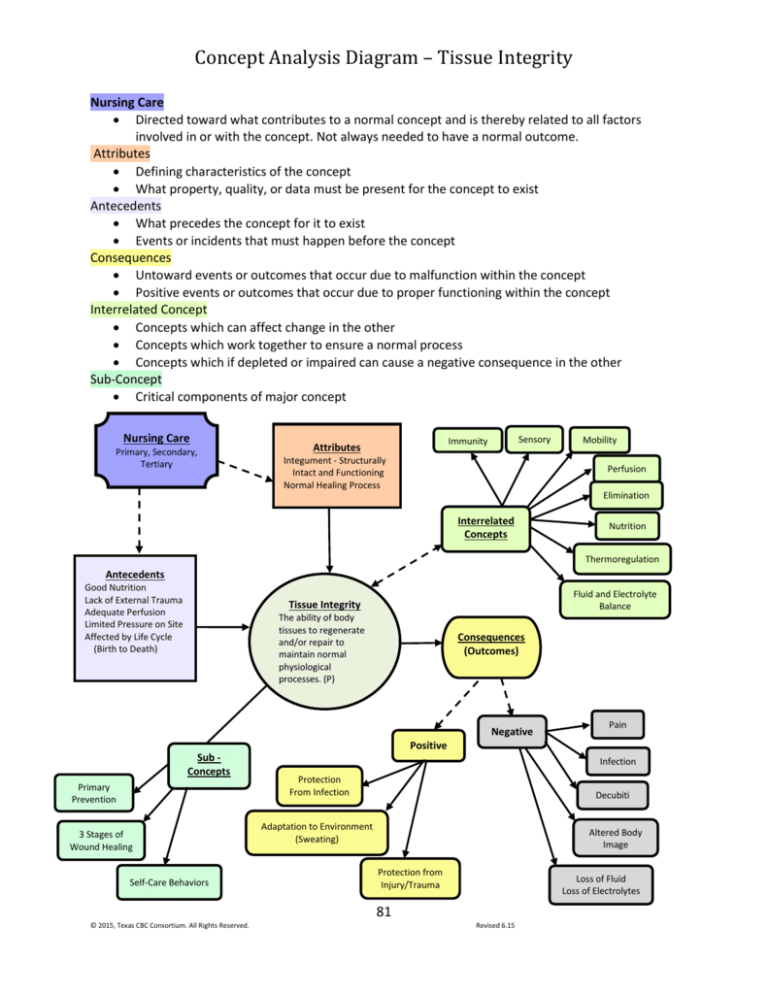
Concept Analysis Diagram – Tissue Integrity
Nursing Care
Directed toward what contributes to a normal concept and is thereby related to all factors
involved in or with the concept. Not always needed to have a normal outcome.
Attributes
Defining characteristics of the concept
What property, quality, or data must be present for the concept to exist
Antecedents
What precedes the concept for it to exist
Events or incidents that must happen before the concept
Consequences
Untoward events or outcomes that occur due to malfunction within the concept
Positive events or outcomes that occur due to proper functioning within the concept
Interrelated Concept
Concepts which can affect change in the other
Concepts which work together to ensure a normal process
Concepts which if depleted or impaired can cause a negative consequence in the other
Sub-Concept
Critical components of major concept
Nursing Care
Primary, Secondary,
Tertiary
Sensory
Immunity
Attributes
Integument - Structurally
Intact and Functioning
Normal Healing Process
Mobility
Perfusion
Elimination
Interrelated
Concepts
Nutrition
Thermoregulation
Antecedents
Good Nutrition
Lack of External Trauma
Adequate Perfusion
Limited Pressure on Site
Affected by Life Cycle
(Birth to Death)
Fluid and Electrolyte
Balance
Tissue Integrity
The ability of body
tissues to regenerate
and/or repair to
maintain normal
physiological
processes. (P)
Consequences
(Outcomes)
Negative
Pain
Positive
Sub Concepts
Primary
Prevention
3 Stages of
Wound Healing
Self-Care Behaviors
Infection
Protection
From Infection
Decubiti
Adaptation to Environment
(Sweating)
Altered Body
Image
Protection from
Injury/Trauma
Loss of Fluid
Loss of Electrolytes
81
© 2015, Texas CBC Consortium. All Rights Reserved.
Revised 6.15
Concept Analysis Diagram – Tissue Integrity
Explanation of Tissue Integrity Diagram:
Tissue integrity is the ability of body tissues to regenerate and/or repair to maintain normal
physiological processes. The attributes which measure if this concept is functioning optimally
include structurally intact and functioning integument, and a normal healing process. The
antecedents are things that must precede the concept for it to exist. The antecedents for Tissue
Integrity include good nutrition, lack of external trauma, adequate perfusion, and limited
pressure on site. Consequences can be positive or negative. Negative consequences are
untoward events or outcomes that occur due to malfunction within the concept. The negative
consequences identified are pain, infection, decubiti, altered self-image, and loss of fluid and
electrolytes. Positive consequences are events or outcomes that occur due to proper
functioning within the concept. The positive consequences identified are protection from
infection, protection from injury/trauma, and adaptation to environment (sweating).
Interrelated concepts are concepts which can affect change in Tissue Integrity, concepts
which work together to ensure a normal process, and concepts which if depleted or impaired
can cause a negative consequence in Tissue Integrity. The interrelated concepts for Tissue
Integrity are Immunity, Perfusion, Thermoregulation, Mobility, Sensory, Nutrition, Elimination,
and Fluids and Electrolytes. Several of these concepts help to maintain normal tissue integrity
and dysfunction of the majority of these concepts can cause a negative consequence to occur.
Some of these concepts such as thermoregulation can cause a dysfunction in Tissue Integrity or
a dysfunction in Tissue Integrity can cause a problem with thermoregulation. Sub- Concepts are
critical components of the major concept. The sub-concepts for Tissue Integrity are primary
prevention, self-care behaviors, and three stages of wound healing. Nursing care is directed
toward what contributes to a normal concept and is thereby related to all factors involved in or
with the concept.
82
© 2015, Texas CBC Consortium. All Rights Reserved.
Revised 6.15

